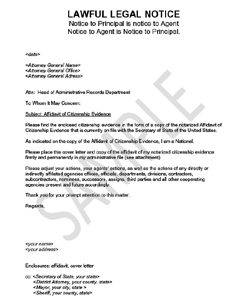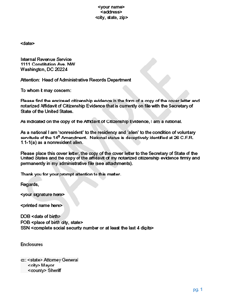STEP TWO: Sending Notices
Sending your notices to government agencies is a critical step to complete.
It is very important not to overlook or postpone this step following the submission of your affidavit. The U.S. Department of State does not automatically inform other relevant agencies, even if you have requested them to do so in your affidavit of citizenship evidence cover letter during Step One. Failing to notify these agencies or any other pertinent entities could potentially complicate the process of defending your status in the event of future interactions.
Submitting a copy of your affidavit of citizenship evidence along with a notice letter to pertinent government agencies serves as formal legal notification that your status has been rectified to that of a national, thereby removing you from their jurisdiction. It is imperative to retain all certified mail receipts for documentation purposes. While the receipt confirms receipt of the documents, it is probable that an official response will not be provided. Furthermore, it is likely that the significance and implications of the notification in relation to their jurisdiction over you may not be fully comprehended.
The reason for this is that once individuals are made aware of your status and jurisdiction, they are no longer able to act against you without consequences. If they continue to act outside their delegated responsibilities, they can be held accountable for their actions. This includes losing their immunity and being personally liable for any misconduct. By cc’ing the attorney general, they are also held accountable as the principal. It is important to understand that notice to the principal is notice to the agent, and vice versa. Therefore, all parties involved are responsible for any actions taken against you.
In essence, you have strategically leveraged your position by proactively informing all relevant agencies of potential future interactions related to your political status. It is important to note that all agencies you have notified are governed by agency laws.
Notice Letter
Use this at your own discretion; it is not legal advice, just an example of content for a notice letter. We recommend that you personalize it for your individual use.

Write a notice letter and attach it to a copy of your affidavit of citizenship evidence and its cover letter. Then mail them together to the attorney general of your state, with carbon copies to agencies and officials in your area.
Who To Notice
Send your notice to anyone you think should be notified. This list is just an example of who we think should receive the notice. Include any other agencies that you want to put on notice that aren’t listed here.
- Your state’s Secretary of State
- Mayor
- Sheriff
- District Attorney
- Chief of Police
- Elections Supervisor
- City Council
- County Supervisor
- Commissioner
- Public Health Department
- Department of Labor
- Department of Revenue
- The Coroner’s Office
- Law Enforcement Agency
- School Districts
- Child Protective Services
- Internal Revenue Service*
*Noticing the IRS
Be sure to include this statement on your notice letter to the IRS:
LAWFUL LEGAL NOTICE, NOT TO BE CONSIDERED AS A FILING
NOTICE TO PRINCIPAL IS NOTICE TO AGENT; NOTICE TO AGENT IS NOTICE TO PRINCIPAL
This statement puts everyone on notice within that agency. The letter to the IRS should also include statements about this not being a filing, and if you do owe the IRS, you will be prepared to pay any taxes you may owe. See the sample we have included below for this specific statement.
It is not my intent to avoid paying any taxes that I may lawfully owe. If it is determined that I owe a tax, I will do my best to pay it promptly.

Notices Package Builder
If you’d like assistance with writing your notice letter, we have developed the following form that will build your notice letter for you. Included are one for the Attorney General of your state with the local agencies in the courtesy copy section and an Internal Revenue Service notice letter with appropriate verbiage.
Feel free to replace our suggestions with government agencies you prefer to notice; only the first six are required. Have your local official’s information handy, as this form will not save your entries for completion later. If you leave the form without submitting it, you may have to start over.
We will email your letters to you with a link to edit them if you need to.
Final Thoughts
- Make one copy of your notice letter for each agency in the CC’s section of the notice letter. Attach a copy of your affidavit of citizenship evidence and its cover letter to each of the agencies copies.
- If you need assistance with properly addressing envelopes to officials, check out this website: https://formsofaddress.info/attorney-general-of-state/
- Send them certified mail with return receipt requested. DO NOT staple your documents together; use paperclips if necessary.
- We suggest that you copy and/or scan each of the signed documents, certified mail receipts, and completed green cards. Keep all copies stored in a safe location.
FAQ’s
Why is cc’ing and mailing a notice to other agencies, in addition to your state’s attorney general, so important?
Notices are important because the cc’d copy of your affidavit legally connects all the agencies that you send a notice to.
Essentially, you’ve weaponized your position if needed by noticing all agencies that you may have future interactions with. All the agencies, you’ll notice, are structured under the laws of agency.
The reason is that once they notice you, they’re aware of your status and that you are outside their jurisdiction and not controlled by those laws any longer. If they still act against you, then they’re acting outside their delegated responsibility and can be held accountable for those actions. They will lose their cloak of immunity, and because you’ve tied them all together with the CC’s notice and the laws of agency, the attorney general will lose their cloak of immunity as well because they are the principal. Notice to the principal is notice to the agent; notice to the agent is notice to the principal. By cc’ing the attorney general, they should have known, and they let it happen anyway; therefore, they are personally liable for the actions of the agents.
- Why put NOTICE TO PRINCIPAL IS NOTICE TO AGENT, NOTICE TO AGENT IS NOTICE TO PRINCIPAL on the notice?
Agency law is the common law doctrine controlling relationships between agents and principals. A principal-agent relationship is created when the agent is given authority to act for the principal. An agreement made by an agent is binding on the principal so long as the agreement was within the authority actually granted to the agent or reasonably perceived by a third party.
By using this statement, you are essentially putting everyone in that agency on notice with one properly written letter.
Can I start my notices before the 21 days?
Yes, you could actually have everything ready to mail on the 22nd day after you’ve mailed your Affidavit of Citizenship Evidence to the U.S. Secretary of State.
Why is it so important to not delay this step?
What we have seen is that by delaying the notices beyond the 21 days, they can sometimes be forgotten all together. You don’t want to get into a situation that could have been prevented by notifying the proper officials. You are no longer in their jurisdiction, and the quicker you notify them, the more it can lessen the chance of having an issue in the future.
Why do I have to wait 21 days to mail my notices after mailing my affidavit to the U.S. Secretary of State?
That timeframe gives the Secretary of State ample time to respond to your affidavit. They don’t usually reply, but we have to give them time before we start noticing our local agencies.
When addressing a notice to the attorney general of a state, why is the salutation “To Whom It May Concern”?
The salutation is “To Whom It May Concern” because the address indicates Attn: Head of the Administrative Records.” To Whom It May Concern is used because the name of the Head of Administrative Records is unknown.


